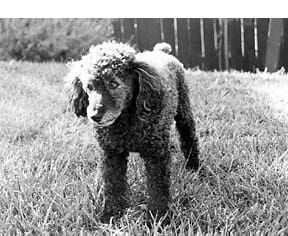August, 1991, was a fateful month for Betty King, a volunteer for Woods Humane Society in San Luis Obispo, California. That was when King first met Daymie, a dark gray miniature Poodle.
“When the gal at the shelter held him up, he started coughing. He just looked awful,” recalls King, who was taking photographs of adoptable dogs for the humane organization. “I knew he would be euthanized if he didn’t get well,” says King. So she decided to take the sickly Poodle to a local veterinary clinic for treatment, get him well, then find him a home. “Who wouldn’t want to adopt a beautiful little Poodle?” says King.
King brought him home and made him a bed in the garage, away from her other dogs, Bonnie, a Springer mix, and Scubby, a Lab mix. “I didn’t allow him in the house with my other dogs since I didn’t know what he had,” she says. The Poodle coughed and coughed, sat with his head hung down, wouldn’t wag his tail or come when called. He didn’t bark or make noise, other than coughing. He had some other unattractive signs of ill health, too. He licked his penis constantly, which caused sores, and when he stood it would not go all the way back into its sheath. He also suffered diarrhea and vomiting. “He was pathetic,” says King.

Right away, King made an appointment with a veterinarian in San Luis Obispo. Daymie was treated for kennel cough and received an injection of antibiotics. “He got a little better within the next few days,” says King. But days later, Daymie’s condition worsened again. Daymie was treated again. At first, the vet suspected a collapsed trachea, but this didn’t prove to be the case.
A few visits later Daymie was still ill, and still coughing violently, so King tried another veterinarian. Daymie was given a cough suppressant, tested for internal parasites and given more antibiotics. “It was frustrating for me because at this point this was just a dog I was going to foster,” says King. “I was just trying to the best for the dog. But I saw no improvement.”
“We’ve come this far”
By this time, Daymie was seen by a vet every week, either for the coughing, diarrhea, vomiting, lethargy, or for the sore penis. “At that point, I remember coming in the house and sitting down,” says King. “I was real frustrated and upset. I told my husband, ‘I can’t get this dog well. I don’t know what to do. We may have to consider having him put down. My husband said, ‘No, we’ve come this far, lets give him a chance’.”
So King officially adopted the sickly Poodle and gave him a name, Daymie. It proved to be a huge commitment and expense. King describes the next six years with the Poodle as “a constant stream of medications for coughing, internal parasites, infections, fevers, eye problems, and liver problems.” He ate poorly, and often vomited what he did eat. “It got to the point where we would feed him anything he would eat,” says King. “He would always eat a lot of lettuce and cabbage.”
During this time, while he did enjoy brief periods with relatively few symptoms, the Poodle seemed to ride along a virtual roller coaster of poor health. He had periods of horrid coughing that would keep the household awake at night. He often vomited or had diarrhea. He would go for days without eating and running a fever, only to have the condition resolve itself as mysteriously as it appeared.
One valley on the roller coaster occurred in October 1996, when Daymie underwent a liver ultrasound and biopsy and was diagnosed with an enlarged, inflamed liver. The veterinarian prescribed medication made for humans. “I remember we were going to drugstores to get this stuff. It was $75 for a little bottle of pills,” says King.
Another major dip occurred in June 1997, when Daymie was diagnosed with progressive retinal atrophy (PRA), which usually leads to blindness. It is found in many breeds of dogs, and is prevalent in toy and miniature Poodles. This genetic condition affects the entire retina and is the canine equivalent of retinitis pigmentosa.
But the deepest valley on the health roller coaster occurred in January 1998, when Daymie’s health declined dramatically. He underwent another liver biopsy, which showed that his liver had atrophied; the functional liver tissue had disappeared and been replaced by scar tissue.
Daymie’s last chance?
About this time, King happened to watch a television show in which the host was interviewing a holistic veterinarian. “At that point,” says King, “I decided I would seek out a holistic vet. I was really impressed. I thought we would give it one more try. Nothing else was working with this dog. I didn’t want to give up on him. He’s been through all this. He deserves to have another try. We had pretty much given up on regular vet care.”

King looked up the directory of members of the American Holistic Veterinary Medical Association (AHVMA) on the Internet, and found the name of a nearby holistic veterinarian, Dr. Diana Bochenski, at the Buellton Veterinary Clinic in Buellton, California. Dr. Bochenski is a licensed veterinarian and is certified in classical homeopathy by the Academy of Veterinary Homeopathy. King had all Daymie’s medical records sent to Bochenski, and she prepared a detailed medical and behavioral history for the doctor’s review prior to Daymie’s appointment.
Dr. Bochenski met with King and Daymie. “She spent one and a half hours talking to us and examining Daymie,” says King. Shortly thereafter, Dr. Bochenski recommended a specific remedy. “Almost immediately (after taking his first homeopathic remedy), Daymie’s energy level picked up,” says King. “He began eating a little bit more food.”
According to veterinary homeopaths, when the correct remedy is given to a patient, it stimulates the body to put itself back in order, to restore the body’s own natural homeostasis. Dr. Bochenski explains the process in simple terms: Basically, you administer a tiny, tiny dose of a substance that, in high doses, would cause symptoms similar to the symptoms that you see in the patient. The entire body mounts a response to the remedy, “resetting” the systems that were out of whack.
“This is the thing that led me to study homeopathy in the first place,” says Dr. Bochenski. “In allopathy, there is really nothing that will stimulate the body to actually heal. A lot of these diseases that we deal with are very frustrating because there is no known cure. However, homeopathy will stimulate a curative response the body to repair itself if there’s enough functioning tissue present. With homeopathy, you have a chance to actually make the disease go away. I would encourage everyone to keep an open mind about alternative methods of treatment because there usually is a good, sound basis for them.”
Daymie continues to improve under Dr. Bochenski’s treatment. In the last two years, he’s received two more doses of the same remedy, and, with Dr. Bochenski’s help, she has formulated a special diet for Daymie, which includes organic mixed grains, vegetables, cooked turkey and chicken, and supplements such as wheat germ, yeast and bonemeal. King has discovered Daymie is allergic to rice, oil and milk products – these foods all make him start coughing.
However, for the past two years – in marked contrast to the previous six years, Daymie has not received any traditional medications. In fact, King feels certain that it was the never-ending stream of drugs, given in response to the signs of disease he displayed, that damaged his liver.
King did obtain a special exemption to her state’s requirement for a rabies vaccine for Daymie, due to his liver condition, so that his already vulnerable system need not be further challenged by the vaccine.
Daymie’s allopathic veterinarian is amazed the miniature Poodle is still alive, says King, but she doesn’t let this triumph go to her head. With Daymie, she says, “We take it one day at a time, and we’re always happy when he eats a meal and greets us at the door with a wagging tail.”
-By Virginia Parker Guidry
Virginia Parker Guidry is a freelance writer from San Diego, CA.






